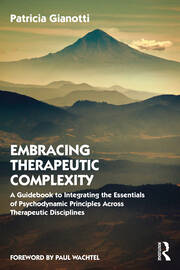Embracing Therapeutic Complexity: A Guidebook to Integrating the Essentials of Psychodynamic Principles Across Therapeutic Disciplines

Book Details
- Publisher : Routledge
- Published : 2022
- Cover : Paperback
- Pages : 229
- Category :
Individual Psychotherapy - Catalogue No : 96519
- ISBN 13 : 9780367636852
- ISBN 10 : 9780367636
Reviews and Endorsements
"Finally, a panacea to the incompetence of manualized and technique-based approaches to treatment! This book is destined to become an invaluable training guide for developing solid psychotherapeutic integration skills that address the complexity and psychodynamic nuances of the contemporary patient. Dr. Gianotti's approach should be taught to every student of psychotherapy." - Jon Mills, Psy.D., Ph.D., ABPP, Postgraduate Programs in Psychoanalysis & Psychotherapy, Adelphi University; Department of Psychosocial & Psychoanalytic Studies, University of Essex; Author of Treating Attachment Pathology.
"Psychoanalysis is not now, and has not been for decades, what many psychotherapists still think it is. Analysts today are centrally concerned with relationship, from the beginning of life, and attachment processes lie at the heart of the theory. Relational psychoanalysis has done much to promote these changes, and so this literature contributes directly and naturally to the general field of psychotherapy. Dr. Gianotti performs a great service by introducing relational psychoanalytic ideas to students and independent professionals who are interested in these ideas, but don’t know how to find their way into them. She makes this introduction in the most practical way, presenting the material in a way that is sensitive to the changing realities of clinical practice, and to practitioners’ uncertainty and worry about 'losing their way.' The book is full of clinical material and will be of interest both to those looking for a route of access into today’s psychodynamic thinking and to psychoanalysts interested in contextualizing their work within the broader field of psychotherapy." - Donnel Stern, Ph.D., Author, The Infinity of the Unsaid: Unformulated Experience, Language, and the Nonverbal
"With this book, Patricia Gianotti offers a remedy for what ails current psychotherapies. Under pressure for quick fixes and inundated with modalities, today’s therapists get lost and de-skilled. Gianotti suggests they ground themselves in certain complexities all therapies share, and she shows them how. She offers elegant big-picture maps that capture the interplay of self-expressive and shame-protective forces in patients’ psychologies. She explains 'loyalty contracts' that block therapeutic progress. She argues for rigorous case conceptualization that includes patients’ developmental and cultural contexts. A master clinician and teacher, Gianotti demonstrates how to drop down through language to right-brain moment-to-moment therapeutic presence, how to navigate psychic splits with delicate compassion, and how to finesse the power of transference for change. This is not a text on learning how to be a skillful relational psychodynamic practitioner, though it will serve that purpose well. As Gianotti intends, it invites all practitioners into a big tent of understanding what they’re doing, offering relief from confusion and self-doubt. With contextual understanding of their patients’ suffering and permission to slow the process down, therapists can re-discover the healing connection that underpins all helpful interventions." - Patricia DeYoung, MSW, Ph.D., Author, Relational Psychotherapy: A Primer and Understanding and Treating Chronic Shame: Healing Right Brain Relational Trauma
"A ‘must read’ for student therapists and senior clinicians alike, Dr. Gianotti takes the rich cacophony of contemporary psychodynamic theory and creates her own unique synthesis. Clear, concise, and jargon-free, these concepts are now ready to be put to use in the clinical encounter. Her approach to psychodynamic formulation and understanding psychopathology are not pathologizing. Instead, Dr. Gianotti emphasizes how symptoms evolve and serve to protect and stabilize a fragile self. In addition she outlines specific clinical interventions, with abundant examples, that show how her psychodynamically-informed approach can help a therapist engage even those patients most resistant to change. This book is a great resource." - Rafael D. Ornstein, M.D., Instructor in Psychiatry, Harvard Medical School.

